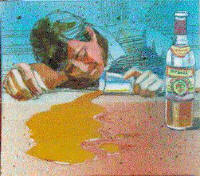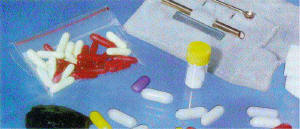Christian Living: Coping with Stress…Without Alcohol or Drugs

What do we see in the world around us? Overcrowding. Interpersonal conflicts. Economic uncertainty. International strife. Uncertainty about the future. A gnawing sense of helplessness. These factors add up to create what Alvin Toffler described as future shock — a vague, continuous feeling of anxiety. It’s a condition that can be described as the disease of change.
Escaping reality
People often try to dull the pain of this 20th century “disease” by using alcohol and drugs (either illegal drugs or prescription medications). But the supposed cure is itself an epidemic. Organizational development consultant Karl Albrecht aptly summarizes today’s state of mind in these words:
The use of mood-altering chemicals in America, and to some extent in other developed countries, has run completely wild. Cultures we are pleased to label “primitive” all without exception reserve the use of tobacco, drugs and intoxicants for special occasions such as celebration and rituals. Only in the so-called advanced cultures do we use these chemically induced altered states of awareness as routine means for escaping reality.

Stress is not necessarily a negative force. After all, stress is not just what happens to us, but how we react to what happens to us. And how we react is controlled by our mind and emotions.
The role of stress
To be alive is to be under a certain amount of stress. As endocrinologist Hans Selye, one of the world’s foremost authorities on stress, said: “Most people who want to accomplish something, who are ambitious, live on stress. They need it.” The right amount of stress can push us to perform at our best.
Stress also serves to protect us in hazardous situations. If we are driving in fast traffic and another car swerves into our lane in front of us, a lot of things immediately happen in our bodies — in the brain, heart, muscular system. The body marshals inner forces and rises to meet the crisis, producing the positive effect of avoiding a collision. But if the crises and pressures around us become so frequent and so intense that we are constantly calling upon inner resources to respond so dramatically, the stress becomes debilitating. The body cannot meet such demands.
Says health educator Leo R. Van Dolson: “When individuals are repeatedly forced to…accept continual change, especially changes involving conflict and uncertainty, an adaptive reaction occurs that draws upon the hormones, causing chemical reactions throughout the body that damage its reserves of energy.”
Having too much stress, which Dr. Selye refers to as hyperstress, can be destructive to our physical and emotional well-being. Many turn to alcohol or drugs to anesthetize the stress produced by emotionally upsetting events or situations: marital quarrels, poverty, fear, loneliness, or job tensions.
These individuals fail to realize, however, that using alcohol or medications to cope with stress only creates further stress, contributing to a vicious and harmful cycle in a person’s life. Using alcohol or drugs is not an effective measure for coping with pressures.
 Right and wrong way to relax
Right and wrong way to relax
For instance, one important key to coping with stress is relaxation. Many psychologists and physicians view occasional recreation not just as a help, but as an essential part of a balanced life. Relaxing by a change of activity restores us.
There are times when it is wise to use drugs to treat chemical imbalances in the body chemistry. Drugs should be used only with the advice of a doctor.
People with drug or alcohol problems do attempt to relax, but only by turning to a bottle filled with alcohol or pills. Substance abusers, rather than learning how to properly relax, rely on drugs to relax. They are confronting their problems in the wrong way. Here is why: The people have not changed the way they live, so they continue to have problems, but they never learn to deal with them except through chemicals. So they keep using chemicals, and in time, more are needed.
Drug reliance, which can develop into addiction and cause a host of other related problems, leads to more stress. Drug users become trapped in the cycle. They use drugs to cope with stress, and this use only creates more stress.

Relaxation is a far better approach – exercise, a change of pace, momentarily getting one’s mind off whatever is causing the stress (and that by mental choice, not with self-prescribed alcohol or drugs). Alcohol should never be used to regularly induce relaxation – a temperate use of alcohol is safely indulged in only by a person who is already mentally relaxed.
Since stress involves a person’s mental or emotional reaction to external events, any effective program must involve, to one degree or another, a change of mind — a reorienting of life priorities. Besides relaxation, there are other effective measures for reducing the debilitating effects stress can have:
* Be realistic. Drug abusers lock themselves into a private world where it is difficult or impossible to get a clear view of the real world. They may mentally magnify their problems out of proportion. They become wrapped up in their difficulties, real or imagined, so that they cannot see anything else.
A person’s problems may be real and serious — a broken marriage, unemployment and lack of money, problems with a child, illness. But dwelling on them to the point of becoming paralyzed by them — unable to take action — does not solve them. The solutions must come through emotional maturity, seeking wise counsel and getting control of one’s life.
Complaining about constant difficult work, for example, only reinforces the stress. Focusing on the reward obtained from the work, on the other hand, will make the work a source of satisfaction rather than tension. Developing this kind of positive attitude toward stress-producing pressures will ease inner tensions. If we become more goal-oriented and look to the ultimate rewards for our efforts, pressures we undergo daily will not seem as difficult to bear.
* Manage your time. Time management is important. It involves making optimum use of the time we have available to do the things that need to be done. It helps to give priority to tasks — to get the most important (and, potentially, most worrisome) things done first.
Retreating to a drug-induced state of euphoria or forgetfulness is not a wise use of time. When an individual comes down from the high, the same problems still exist. The same tasks remain undone, and may by then be even more urgent. The person may choose, then, to flee once again to the private, “safe,” drugged world. It would be far better to manage time wisely and get things done. The resulting sense of accomplishment would produce its own circle of events — this one positive — encouraging the person to accomplish more.
* Improve general health. Healthy, physically fit people can cope with a vast amount of pressure. They are adaptable, positive and generally hopeful. Poor health magnifies the small irritations of life and prolongs a cycle of illness. In the matter of improving general health, consider diet, exercise, rest, getting enough sunshine and developing self-control. Substance abuse harms good health, thus putting more stress on the body and inviting further drug abuse to try to cope with the new problems.
* Incorporate alternatives to stress. Life is filled with many sources of anxiety and unnecessary stimulation. We can choose to avoid some of these areas that induce stress unnecessarily, such as in the entertainment we pursue. When we stimulate our minds with an barrage of loud noise, and with themes that center on violence, crime and interpersonal tragedy, we voluntarily induce stress.
An added dimension
These techniques help us deal with physical problems. But the long-range solution to hyperstress and alcohol and drug abuse problems involves changing the way human nature functions. The Bible provides advice on attitudinal changes that will help us deal with stress, emotional maturity and mental health.
“Anxiety weighs down the heart, but a kind word cheers it up” (Proverbs 12:25). What makes a person “cheer up,” to have a positive, optimistic, constructive frame of mind? Alcohol or other drugs? No! Coping with anxiety involves developing a constant, positive attitude and approach to life. It is important to help and encourage others by your thoughtful words, and to receive support from others.
“A cheerful heart is good medicine, but a crushed spirit dries up the bones” (Proverbs 17:22). The medicine we need is rarely a chemical! What we need is an outgoing, optimistic approach to life and resultant interest in others’ needs.
“A heart at peace gives life to the body, but envy rots the bones” (Proverbs 14:30). Do drugs produce this peaceful state of mind, this attitude of contentment that gives “life to the body” — that promotes a successful, happy life? Hardly. The Bible is not suggesting chemical solutions to human problems and stress. The answer is in a person’s basic approach to life.
Pursuing one’s own desires and creature comforts will not make anyone happy in the long run. Such pleasures are at best temporary. Jesus Christ summed it up: “It is more blessed to give than to receive” (Acts 20:35). There it is! Preoccupation with self only contributes to the hyperstress that has caused or compounded many of this world’s problems. It is chasing after something that cannot satisfy our desires for meaning in life.
Resolving hyperstress and the evils that go with it is a matter of changing one’s whole life-style from a general pattern of taking and selfishness to a life-style of giving, of service, of concern for others equal to or greater than concern for self. Dr. Selye, an endocrinologist, often said that hate causes stress and love eliminates it. He asked, “If everyone loved his neighbor as himself, how could there be any war, crime, aggression or even tension among people?”
Psychologist Erich Fromm notes: “Not he who has much is rich, but he who gives much. The hoarder who is anxiously worried about losing something is, psychologically speaking, the poor, impoverished man, regardless of how much he has.” In comparing the giving, loving person to the selfish person. Dr. Fromm continues: “The selfish person is interested only in himself, wants everything for himself, feels no pleasure in giving, but only in taking. The world outside is looked at only from the standpoint of what he can get out of it.”
But what selfish people do not realize is that their own selfishness is the root of their troubles. Selfishness leaves a person “empty and frustrated. He is necessarily unhappy and anxiously concerned to snatch from life the satisfactions which he blocks himself from attaining.”
In short, if we give instead of take, our problems and tensions fade away. Strange? It shouldn’t be. As we live in this way of giving, then debilitating stress will diminish — even disappear — from our lives. Then we can, as the apostle Paul put it: “Do not be anxious about anything, but in every situation, by prayer and petition, with thanksgiving, present your requests to God. And the peace of God, which transcends all understanding, will guard your hearts and your minds in Christ Jesus” (Philippians 4:6-7).
